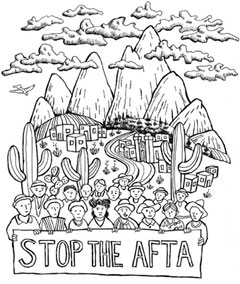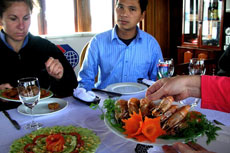Human Flower Project
Monday, November 28, 2005
Colombia: Cutting Corners on Cut Flowers
The California Cut Flower Commission has rounded up its Congressional delegation, and says Colombia has cheated on a flower-trade pact with the U.S..
 Image: consensus.net
Image: consensus.net
Except for a few international mega-farmers and some trade negotiators with their careers on the line, nobody seems to like the Andean Free Trade Agreement. The first pact, made in 1991, ostensibly was to wean the Colombian economy from growing coca and trading in narcotics.
This speech from U.S. Trade Rep. Robert Zoellick (2002) trumpets Colombia’s cut flowers as the showiest sign of AFTA’s success.
“As many of you know, a free flow of exports – and imports – can help to inject new energy into the Colombian economy. The Colombian flower industry embodies the success of Colombia’s export sector. In 1965, Colombia exported just $20,000 worth of flowers. Ten years later, flower exports were valued at more than $20 million. And today, these exports total nearly $600 million. The flower industry generates 75,000 direct jobs in Colombia – and these are good jobs, offering year-round stability and health and retirement benefits.
“Nearly 85 percent of Colombia’s flower exports go to the United States, and these shipments have contributed to impressive job creation in our home market: 7,000 people work in jobs connected to the imports of Colombia’s flowers; aviation and trucking companies that transport Colombian flowers employ some 3,600 people; U.S. supermarkets employ more than 24,000 people in their flower departments; and U.S. flower shops employ nearly 125,000 people.”
Who’s he kidding? With the influx of cheap flowers, chain groceries have put thousands of independent U.S. florists out of business, and thousands of growers in the U.S. have given up flower farming. Also, just this month Human Rights Watch and the AFL/CIO, among others, have lodged objections to the AFTA over working conditions in Ecuador. Now the California Cut Flower Commission, claiming that Colombia is unfairly subsidizing its flower production, says it may sue the Colombian government.
“It’s unfair, and it’s illegal,” Peggy Dillon of the CCFC told the Santa Cruz paper. AFTA stipulates that “Colombia’s flower growers can only receive $15 million a year in subsidies…. When the Colombian government announced last year that it was going to give hundreds of growers as much as $40 million to help offset the devaluation of the peso against the dollar” California growers began mobilizing themselves and their Congressional delegation.
Rep. Sam Farr, D-Carmel, leading the charge, called the increased subsidies, “a slap in the face to our growers, not to mention illegal under WTO trade rules.”
 California rose
California rose
Photo: California Cut Flower Commission
Santa Cruz County, California, was a center for rose production as recently as 20 years ago. Now “there are fewer than a dozen rose growers left.” U.S. rosarians have tried disparaging the big blooms of Peru, Colombia, Bolivia and Ecuador. “They kind of look like a small piece of cabbage,” said Arne Thirup, a grower in Pajaro. “They don’t open up like our roses do.” But the fact is most U.S. consumers like the big Southern roses just fine—Roses grown in Latin America now make up 80% of the U.S. market. “What’s mainly left is the wedding industry,” one California grower told the Santa Cruz Sentinel. “It’s very high end”—a bastion of conspicuous consumption in an otherwise cut-rate society.
The complexities of trade agreements are, honestly, beyond us, but here are some diverse views of the Andean Free Trade Agreement: a rah-rah report issued via the Japanese Embassy, a more modulated assessment from the Global Policy Forum, the U.S. Chamber of Commerce line, and an up-to-date report from a blogger on Colombian issues.
Of them all, this account from Javier Ponce, a columnist in Quito, Ecuador, rings truest to us. Ponce writes that “the greatest economic potential of the FTA lies in the products controlled by the big agricultural corporations: banana, flowers, broccoli, and palm hearts.” Meanwhile, small farmers who grow rice, meat, and maize—the region’s food supply—will be dispossessed.
For now, Colombia and Ecuador have broken off talks with the U.S. over AFTA. If the California growers and their Congresspeople can ever join forces with U.S. labor-rights activists and environmentalists, there will be just a madrigal group of supporters left. The Andean Free Trade Agreement may very well be redesignated in 2006: as an international trade “Disagreement.”




